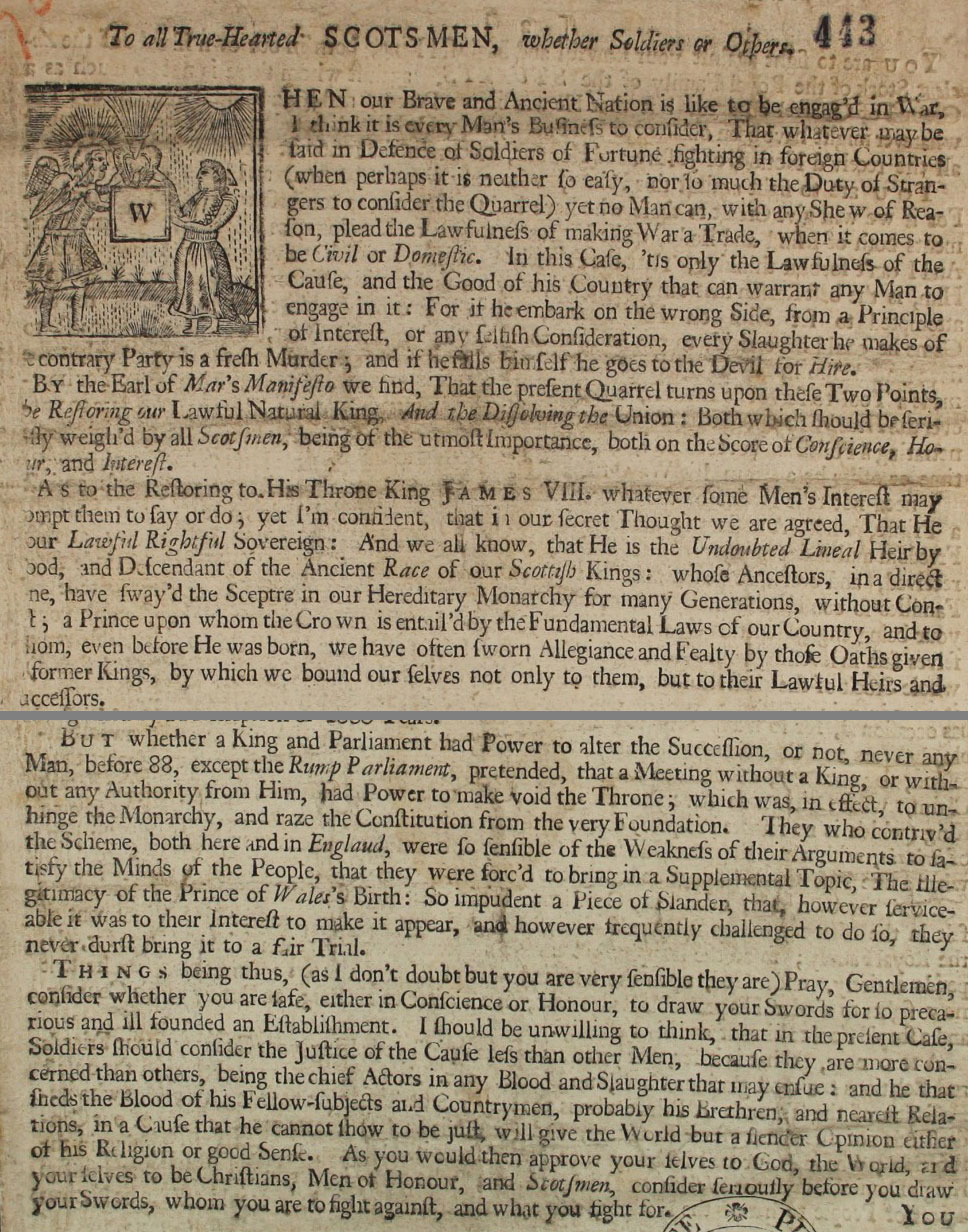
A handbill addressed ‘to all true-hearted Scotsmen’ to restore James Francis Edward to the throne, 1 January 1715 (SP 54/10/173)
Transcript
To all True-Hearted SCOTSMEN, whether Soldiers or Others.
When our Brave and Ancient Nation is like to be engag’d in War, I think it is every Man’s Business to consider, That whatever may be said in Defence of Soldiers of Fortune fighting in foreign Countries (when perhaps it is neither so easy, nor so much the Duty of Strangers to consider the Quarrel) yet no Man can, with any Shew of Reason, plead the Lawfulness of making War a Trade, when it comes to be Civil or Domestic. In this Case, ‘tis only the Lawfulness of the Cause, and the Good of his Country that can warrant any Man to engage in it: For if he embark on the wrong Side, from a Principle of Interest, or any selfish Consideration, every Slaughter he makes of a contrary Party is a fresh Murder; and if he falls himself he goes to the Devil for Hire.
By the Earl of Mar’s Manifesto we find, That the present Quarrel turns upon these Two Points, be Restoring our Lawful Natural King. And the Dissolving the Union: Both which should be [seriously] weigh’d by all Scotsmen, being of the utmost Importance, both on the Score of Conscience, Hour, and Interest.
As to the Restoring to His Throne King JAMES VIII. Whatever some Men’s Interest may [prompt] them to say or do; yet I’m confident, that in our secret Thought we are agreed, That He our Lawful Rightful Sovereign: And we all know, that He is the Undoubted Lineal Heir by [blood] and Descendant of the Ancient Race of our Scottish Kings: whose Ancestors, in a direct [line], have sway’d the Sceptre in our Hereditary Monarchy for many Generations, without Cont.; a Prince upon whom the Crown is entail’d by the Fundamental Laws of our Country, and to whom, even before He was born, we have often sworn Allegiance and Fealty by those Oaths given former Kings, by which we bound ourselves not only to them, but to their Lawful Heirs and accessors.
……
BUT whether a King and Parliament had Power to alter the Succession, or not, never any Man, before [1688], except the Rump Parliament, pretended, that a Meeting without a King, or without any Authority from Him, had Power to make void the Throne; which was, in effect, to unhinge the Monarchy, and raze the Constitution from the very Foundation. They who contriv’d [thought up] the Scheme, both here and in England, were so sensible of the Weakness of their Arguments to satisfy the Minds of the People, that they were forc’d to bring in a Supplemental Topic, The illegitimacy of the Prince of Wales’s Birth [suggestion here that that Charles Francis Edward was not the true son of James II-hence call him the “Old Pretender”] So impudent a Piece of Slander, that, however serviceable it was to their Interest to make it appear, and however frequently challenged to do so, they never durst bring it to a fair Trial.
THINGS being thus, (as I don’t doubt but you are very sensible they are) Pray, Gentlemen, consider whether you are safe, either in Conscience or Honour, to draw your Swords for so precarious and ill-founded an Establishment. I should be unwilling to think, that in the present Case, Soldiers should consider the Justice of the Cause less than other Men, because they are more concerned than others, being the chief Actors in any Blood and Slaughter that may ensue: and he that sheds the Blood of his Fellow-subjects and Countrymen, probably his Brethren and nearest Relations, in a Cause that he cannot show to be just, will give the World but a slender Opinion either of his Religion or good Sense. As you would then approve your selves to God, the World, and your selves to be Christians, Men of Honour, and Scotsmen, consider seriously before you draw your Swords, whom you are to fight against, and what you fight for
Source 3 Glossary
Manifesto: a public declaration of intentions or opinions
The Union: The Acts of Union were two Acts of Parliament: the Union with Scotland Act 1706 passed by the Parliament of England, and the Union with England Act passed in 1707 by the Parliament of Scotland. England and Scotland, both separate states with the same monarch, became a united kingdom called ‘Great Britain’
King James VIII: King of Scotland, and as James III of England and Ireland, James Francis Edward Stuart, ‘The Old Pretender’
Fundamental: basic
Entail’d: tied
Fealty: loyalty, devotion
Accessors: descendants
Raze: bring down
Constitution: rules of the country
Void the Throne: decide who would be king
Supplemental Topic: an extra argument
Impudent: outrageous
Draw your Swords: take up arms
Questions
- What is James Francis Edward Stuart’s claim to the throne of Britain, according to this extract?
- How does this differ from source 2 as piece of propaganda? (Clue: think about style of language, tone, use of fonts, audience)
